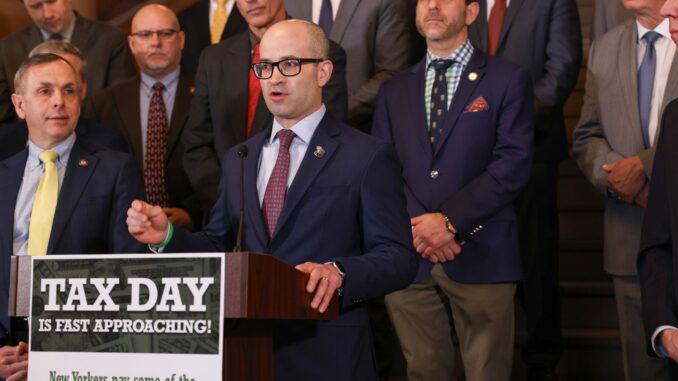
By Hank Russell
Deal? What deal? That is what Assemblyman Ed Ra is asking.
Ra (R-Franklin Square) announced that, on April 29, the Assembly passed its ninth budget extender to keep government operations running as negotiations on the overdue state budget continue, but no deal being finalized.
As previously reported in Long Island Life & Politics, Governor Kathy Hochul announced that a deal was reached on the 2025-26 budget. With a price tag of $254 billion, it included some of what the governor pushed for, including a middle-class tax cut, cellphone bans in schools, and money for border security, mental health and gun prevention, among other items.
“We’re once again voting on a straight extender — no added measures — just to keep the lights on,” Ra said, adding the budget does not contain “bill language needed to enact a state budget. We could see this language as early as today.”
He said the fact that neither Assembly Leader Carl Heastie (D-Bronx) nor Senate Majority Leader Andrea Stewart-Cousins (D-Yonkers) has yet to approve the budget, which “raises questions about how finalized this deal actually is.” Ra said state spending will increase to nearly $11 billion over last year, which he said is “another example of bloated budgeting that threatens our long-term fiscal health.”
However, despite the delay in getting the budget approved, Ra saw some items that he liked, including maintaining reserves, delivering middle-class tax relief, expanding child care access, implementing long-overdue discovery reforms and pushing for more MTA accountability. “These are priorities Assembly Republicans have consistently supported.”
Otherwise, too much of the budget “feels like political messaging over sound policy,” Ra said. He pointed out that the one-time inflation checks that New York taxpayers will receive “won’t provide real relief to most middle-class families,” and funding for childcare “doesn’t address the core issue of staffing shortages.”
Ra also said that the budget does not address the state’s unresolved federal unemployment insurance debt, which would be “a burden that continues to fall on small businesses.” Additionally, the proposed payroll mobility tax increase “could further hurt job growth and investment in already struggling sectors.”
“We may be moving forward, but we’re far from finished,” Ra concluded. “This budget needs to do more than check boxes — it must deliver long-term stability for working families and small businesses.”

